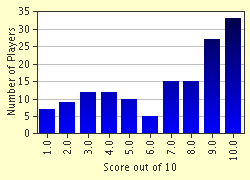Quiz Answer Key and Fun Facts
1. The main character of "Things Fall Apart", the proud and tempestuous Okonkwo, is defined early in the novel by his relationship with his father, Unoka. Which of these best describes this relationship?
2. Throughout the book, an unusual currency is used for most transactions. What is this unlikely coin of the realm?
3. The main political unit in "Things Fall Apart" is the alliance of "nine villages", including Okonkwo's village of Umuofia. Following the murder of one of Umuofia's women (identified in the text only as "Udo's wife"), Okonkwo negotiates a peace with Umuofia's enemies, wherein they will send Udo a virgin as compensation and give up one of their young boys as well. The boy, Ikemefuna, becomes a part of Okonkwo's household, even calling Okonkwo "father". What ends up happening to Ikemefuna?
4. In Chapter 8, Okonkwo is having a discussion with several of his village's men. One of them, Obierika, remarks that in two other villages (Abame and Aninta) titled men climb trees and pound food for their wives, tasks seen as women's work in Umuofia. Okonkwo replies that in some tribes the children belong to the wife and her family, a proposition a third man, Machi, dismisses as ludicrous. Obierika concludes this discussion with a tall tale he has heard, that there are ___________.
5. Chapter 13 sees Okonkwo banished from Umuofia for killing someone. What were the circumstances of this homicide?
6. The first British evangelist in the area, Mr. Brown, callously disregards local customs, learning nothing of Umuofia's traditional spirituality while imposing his own. Fittingly, his church collapses, a victim of the spirits in Umuofia's taboo area, the "evil forest".
7. Mr. Brown is succeeded by Mr. Smith, who, in contrast to Brown, is much more open and understanding, making much greater allowance for native customs.
8. A recurrent motif of "Things Fall Apart" is the assumption of divine roles by the worthy men of the village. These men wear masks representing figures like the evil forest and the tree spirit, and take the collective title "egwugwu". At the annual feast of the Earth deity, a Christian convert named Enoch shows his disregard for the egwugwu by ripping off one of their masks. How do they egwugwu retaliate for this offense?
9. After various legal struggles with the British administration, including the capture of several of Umuofia's leaders (including Okonkwo) and the leveling of heavy fines, a meeting is called in the marketplace to organize opposition to these depredations. Five British court messengers arrive to break up this assembly. What action does Okonkwo take?
10. The novel concludes with the British District Commissioner contemplating Okonkwo's life, remarking to himself that it would make for a fascinating paragraph in his upcoming book: "The Pacification of the Primitive Tribes of the Lower Niger".
Source: Author
stuthehistoryguy
This quiz was reviewed by FunTrivia editor
agony before going online.
Any errors found in FunTrivia content are routinely corrected through our feedback system.

